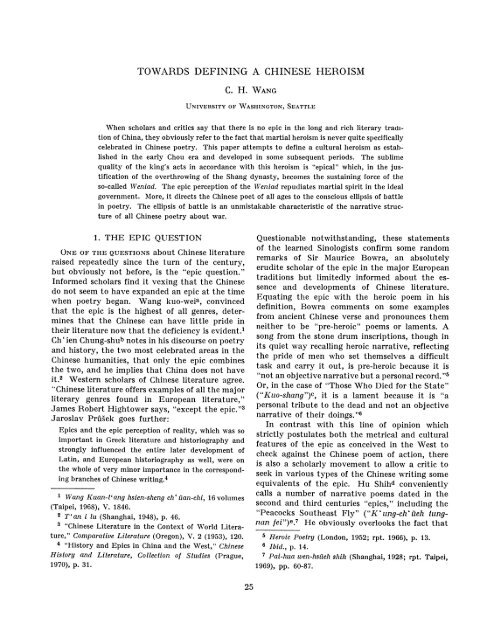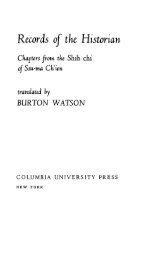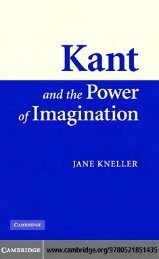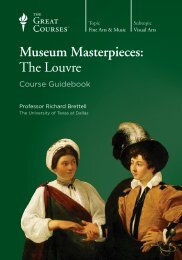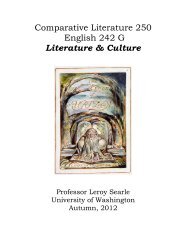Ellipsis of Battle.pdf - University of Washington
Ellipsis of Battle.pdf - University of Washington
Ellipsis of Battle.pdf - University of Washington
You also want an ePaper? Increase the reach of your titles
YUMPU automatically turns print PDFs into web optimized ePapers that Google loves.
TOWARDS DEFINING A CHINESE HEROISM<br />
C. H. WANG<br />
UNIVERSITY OF WASHINGTON, SEATTLE<br />
When scholars and critics say that there is no epic in the long and rich literary tradi-<br />
tion <strong>of</strong> China, they obviously refer to the fact that martial heroism is never quite specifically<br />
celebrated in Chinese poetry. This paper attempts to define a cultural heroism as estab-<br />
lished in the early Chou era and developed in some subsequent periods. The sublime<br />
quality <strong>of</strong> the king's acts in accordance with this heroism is "epical" which, in the jus-<br />
tification <strong>of</strong> the overthrowing <strong>of</strong> the Shang dynasty, becomes the sustaining force <strong>of</strong> the<br />
so-called Weniad. The epic perception <strong>of</strong> the Weniad repudiates martial spirit in the ideal<br />
government. More, it directs the Chinese poet <strong>of</strong> all ages to the conscious ellipsis <strong>of</strong> battle<br />
in poetry. The ellipsis <strong>of</strong> battle is an unmistakable characteristic <strong>of</strong> the narrative struc-<br />
ture <strong>of</strong> all Chinese poetry about war.<br />
1. THE EPIC QUESTION<br />
ONE OF THE QUESTIONS about Chinese literature<br />
raised repeatedly since the turn <strong>of</strong> the century,<br />
but obviously not before, is the "epic question."<br />
Informed scholars find it vexing that the Chinese<br />
do not seem to have expanded an epic at the time<br />
when poetry began. Wang kuo-weia, convinced<br />
that the epic is the highest <strong>of</strong> all genres, deter-<br />
mines that the Chinese can have little pride in<br />
their literature now that the deficiency is evident.1<br />
Ch' ien Chung-shub notes in his discourse on poetry<br />
and history, the two most celebrated areas in the<br />
Chinese humanities, that only the epic combines<br />
the two, and he implies that China does not have<br />
it.2 Western scholars <strong>of</strong> Chinese literature agree.<br />
"Chinese literature <strong>of</strong>fers examples <strong>of</strong> all the major<br />
literary genres found in European literature,"<br />
James Robert Hightower says, "except the epic."3<br />
Jaroslav Prusek goes further:<br />
Epics and the epic perception <strong>of</strong> reality, which was so<br />
important in Greek literature and historiography and<br />
strongly influenced the entire later development <strong>of</strong><br />
Latin, and European historiography as well, were on<br />
the whole <strong>of</strong> very minor importance in the correspond-<br />
ing branches <strong>of</strong> Chinese writing.4<br />
1 Vang Kuan-t'ang hsien-sheng ch' iian-chi, 16 volumes<br />
(Taipei, 1968), V. 1846.<br />
2 T'an i lu (Shanghai, 1948), p. 46.<br />
3 "Chinese Literature in the Context <strong>of</strong> World Litera-<br />
ture," Comparative Literature (Oregon), V. 2 (1953), 120.<br />
4 "History and Epics in China and the West," Chinese<br />
History and Literature, Collection <strong>of</strong> Studies (Prague,<br />
1970), p. 31.<br />
25<br />
Questionable notwithstanding, these statements<br />
<strong>of</strong> the learned Sinologists confirm some random<br />
remarks <strong>of</strong> Sir Maurice Bowra, an absolutely<br />
erudite scholar <strong>of</strong> the epic in the major European<br />
traditions but limitedly informed about the es-<br />
sence and developments <strong>of</strong> Chinese literature.<br />
Equating the epic with the heroic poem in his<br />
definition, Bowra comments on some examples<br />
from ancient Chinese verse and pronounces them<br />
neither to be "pre-heroic" poems or laments. A<br />
song from the stone drum inscriptions, though in<br />
its quiet way recalling heroic narrative, reflecting<br />
the pride <strong>of</strong> men who set themselves a difficult<br />
task and carry it out, is pre-heroic because it is<br />
"not an objective narrative but a personal record."5<br />
Or, in the case <strong>of</strong> "Those Who Died for the State"<br />
("Kuo-shang")c, it is a lament because it is "a<br />
personal tribute to the dead and not an objective<br />
narrative <strong>of</strong> their doings."6<br />
In contrast with this line <strong>of</strong> opinion which<br />
strictly postulates both the metrical and cultural<br />
features <strong>of</strong> the epic as conceived in the West to<br />
check against the Chinese poem <strong>of</strong> action, there<br />
is also a scholarly movement to allow a critic to<br />
seek in various types <strong>of</strong> the Chinese writing some<br />
equivalents <strong>of</strong> the epic. Hu Shihd conveniently<br />
calls a number <strong>of</strong> narrative poems dated in the<br />
second and third centuries "epics," including the<br />
"Peacocks Southeast Fly" ("K'ung-ch'iieh tung-<br />
nan fei")e.7 He obviously overlooks the fact that<br />
5 Heroic Poetry (London, 1952; rpt. 1966), p. 13.<br />
6 Ibid., p. 14.<br />
7 Pai-hua wen-hsiieh shih (Shanghai, 1928; rpt. Taipei,<br />
1969), pp. 60-87.


